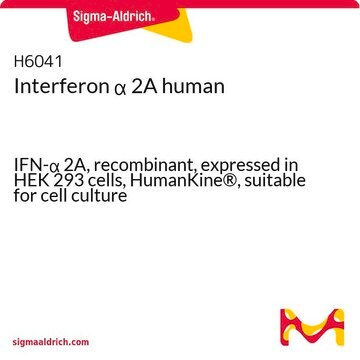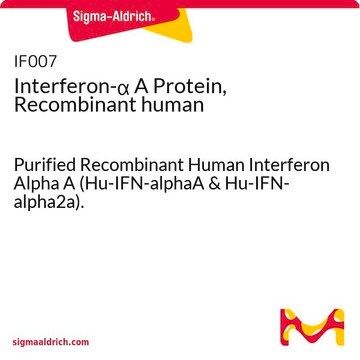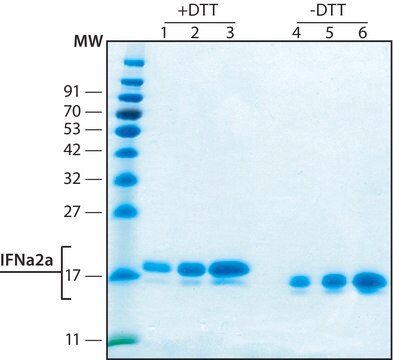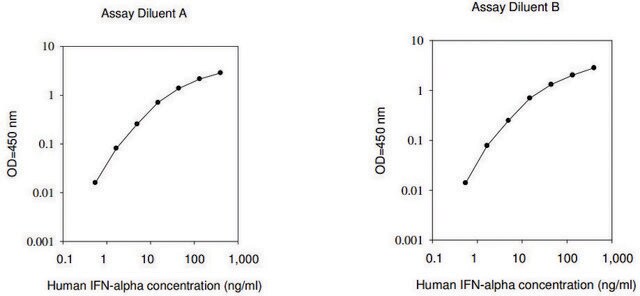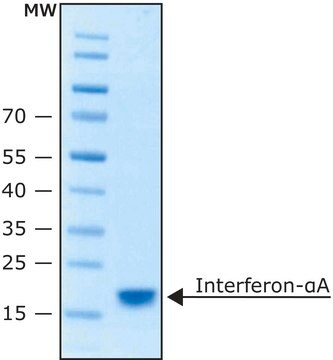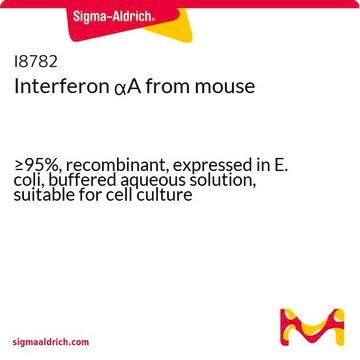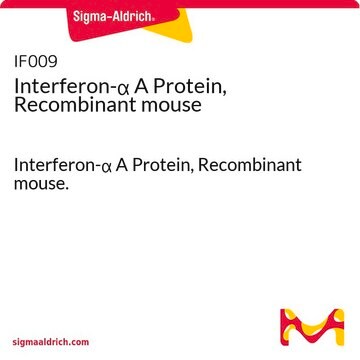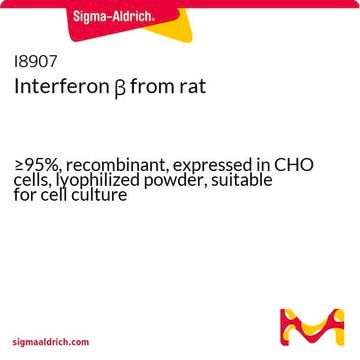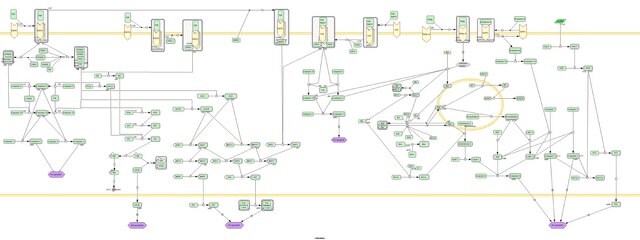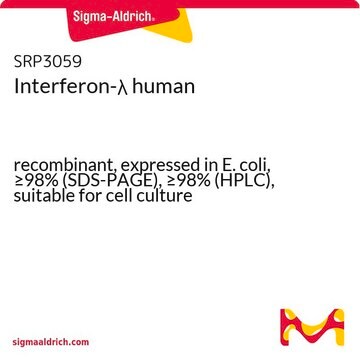SRP4596
IFN-alpha 1 human
recombinant, expressed in E. coli, ≥95% (SDS-PAGE), ≥95% (HPLC)
Synonym(s):
IFN-α 1, IFNA1, Interferon-α
Sign Into View Organizational & Contract Pricing
All Photos(1)
About This Item
Recommended Products
biological source
human
recombinant
expressed in E. coli
assay
≥95% (HPLC)
≥95% (SDS-PAGE)
form
lyophilized
potency
1x10^8 units/mg
mol wt
~19.3 kDa
packaging
pkg of 100 μg
storage condition
avoid repeated freeze/thaw cycles
impurities
endotoxin, tested
NCBI accession no.
UniProt accession no.
shipped in
wet ice
storage temp.
−20°C
Gene Information
human ... IFNA1(3439)
General description
IFN-α1 (interferon α 1) is a type 1 interferon. Human IFN-a1 is a 19.3kDa protein containing 166 amino acid residues. IFN-α1 belongs to the type I interferon (IFN) family and is present in leukocytes. The IFN-α1 gene is mapped to human chromosome 9p21.3.
Application
IFN-alpha 1 human has been used:
- to treat Vero and breast cancer (MDA-MB-231) cells in interferon assay before viral infection
- as a ligand to vaccinia virus B18R protein in analytical size exclusion chromatography
- to treat chikungunya infected human embryonic kidney cell line (HEK293T) to test its effect on Signal transducer and activator of transcription 1 (STAT1) phosphorylation
- as recombinant interferon to treat lung fibroblast cell line (IMR90) to monitor histone chaperone (HIRA) response
Biochem/physiol Actions
IFN-α1 (interferon α 1) is a lymphoid factor that possesses potent anti-viral activity. IFN-α1 interacts with IFNAR1 (interferon α receptor 1) and IFNAR2. The interaction activates JAK1 (janus-activated kinase 1) and tyrosine kinase 2. These events phosphorylate and activate STAT1 and STAT2 (signal transducer and activator of transcription proteins), leading to the upregulation of interferon-stimulated genes some of which encode antiviral proteins. IFN-alpha 1 (IFN-α1) mediates apoptosis in specific tissues. It may be useful in treating laryngeal carcinoma. The interaction of microRNA, miR-181b with IFN-α1, is regarded as a risk factor in systemic lupus erythematosus.
Physical form
Lyophilized without any additives.
Reconstitution
Centrifuge the vial prior to opening. Avoid freeze-thaw cycles.
Reconstitute in water to a concentration of 0.1-1 mg/mL. This solution can then be diluted into other aqueous buffers.
Storage Class
11 - Combustible Solids
wgk_germany
WGK 3
flash_point_f
Not applicable
flash_point_c
Not applicable
Certificates of Analysis (COA)
Search for Certificates of Analysis (COA) by entering the products Lot/Batch Number. Lot and Batch Numbers can be found on a product’s label following the words ‘Lot’ or ‘Batch’.
Already Own This Product?
Find documentation for the products that you have recently purchased in the Document Library.
Customers Also Viewed
Purification and characterization of multiple components of human lymphoblastoid interferon-alpha.
Zoon KC, et al.
The Journal of Biological Chemistry, 267, 15210-15216 (1992)
Rajani Rajbhandari et al.
Oncotarget, 6(19), 17805-17816 (2015-07-15)
Glioblastomas (GBMs) are deadly tumors of the central nervous system. Most GBM exhibit homozygous deletions of the CDKN2A and CDKN2B tumor suppressors at 9p21.3, although loss of CDKN2A/B alone is insufficient to drive gliomagenesis. MIR31HG, which encodes microRNA-31 (miR-31), is
Yong-Ling He et al.
BioMed research international, 2020, 4757065-4757065 (2020-05-10)
A previous work has discovered that chromosome 1q32 locus linked to the risk of systemic lupus erythematosus (SLE) and miR-181b located on the susceptibility site with downregulation inversely correlating to its target molecular interferon alpha 1 (IFNA1). The purpose of
K Oritani et al.
Cytokine & growth factor reviews, 12(4), 337-348 (2001-09-07)
The type I interferon (IFN) family includes IFN-alpha, IFN-beta, IFN-pi, and IFN-tau. These molecules are clustered according to sequence homologies, use of the same cell surface receptor, and similar functions. IFN-alpha and IFN-beta have a globular structure composed of five
Xing Liu et al.
Journal of virology, 93(2) (2018-11-09)
Oncolytic herpes simplex virus 1 (HSV-1), devoid of the γ134.5 gene, exerts antitumor activities. However, the oncolytic effects differ, ranging from pronounced to little responses. Although viral and host factors are involved, much remains to be deciphered. Here we report
Our team of scientists has experience in all areas of research including Life Science, Material Science, Chemical Synthesis, Chromatography, Analytical and many others.
Contact Technical Service